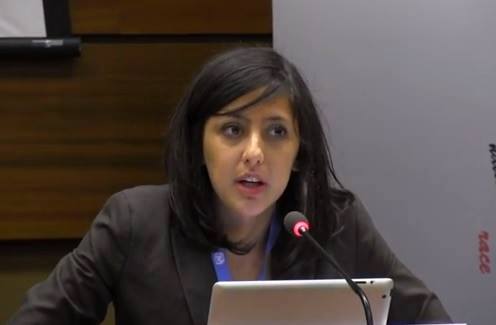Source: genevasolutions.news
Simin Fahandej

With the mandate for the special rapporteur on human rights in Iran set to be renewed at the next Human Rights Council session in March, the country’s government needs to be held accountable for its persistent persecution of members of the Baha’i faith, writes Simin Fahandej, representative of the Baha’i International Community’s United Nations Office in Geneva.
Talks between Iran and western countries are inching ahead, in Vienna, as negotiators attempt to revive the 2015 nuclear deal known as the Joint Comprehensive Plan of Action. However, the lack of inclusion in these talks of the rights of minorities in Iran — including the rights of the Baha’is, Iran’s largest non-Muslim religious community — shows the fragmented nature of political processes. If the pandemic has taught us one lesson it’s that events in one part of the world inevitably affect another, in all areas, and that solutions require coordinated global action to be effective. Human rights, by the same logic, cannot be put aside to save the nuclear deal.
Iran for me is more than just an elusive deal or a series of stark headlines. Eight members of my family, including my aunt and uncle, were executed by the Iranian authorities after the 1979 Islamic Revolution. My family and I were later forced to leave Iran when I was 12 years old. All this happened to us, and thousands of others, because we are members of the Baha’i Faith, an independent global religion founded in Iran with adherents in 230 countries and territories. Baha’is believe in the oneness of humanity, gender equality, and in striving to serve our fellow human beings.
Baha’is in Iran have been systematically persecuted by the Iranian government since the 1979 Islamic Revolution. Years of United Nations reports show that Baha’is are suppressed and persecuted because of their beliefs. They are monitored, denied access to university, their businesses are confiscated and lands appropriated, and media outlets spread hate speech against them every day. Ayatollah Ali Khamenei, Iran’s supreme leader, signed a memorandum in 1991 calling for these policies.
The Baha’i International Community, which represents the Baha’is at the UN and where I work as a representative, has found that today in Iran more than a thousand Baha’is are awaiting legal hearings or to be summoned to begin prison sentences. Each of these individuals has been arrested, tried, intimidated and interrogated, and released only on exorbitant bails; and now their limbo, as they wait to go to jail, is just another form of psychological torture.
Last month was also the fortieth anniversary of the execution by Iranian authorities of the members of Iran’s Baha’i National Assembly – a democratically-elected governing body that administers the affairs of the community in every country. Le Monde, The Times, The Guardian and the New York Times all reported on these executions – which were just a handful of more than 200 killings in the early years of the Revolution.The members of the Assembly were detained after a meeting, and then, without due process, in secret, were convicted without evidence and executed. Their sham of a trial was exposed in a 2015 BBC documentary, Revolutionary Justice, which featured grainy footage taken in the final hours of their lives.
The United Nations and many governments protested against the mass executions of the early 1980s – this global outcry helped bring the killings to an end.
Today most sessions of the UN’s Human Rights Council raise the situation of the Baha’is in Iran. But the Iranian government insists that the UN “interferes” with its national sovereignty when it condemns the violation of the rights of Baha’is and other minorities. More progressive understandings of sovereignty, however, argue that the right to state sovereignty entails not only rights but also responsibilities and that the right to govern hinges on the responsibility to protect. Iran recognised these duties when it signed international covenants on human rights: it must now honour them.
The mandate of the UN Special Rapporteur for the human rights situation in Iran will be considered at the next Human Rights Council session. And, in Vienna, the nuclear talks will move forward. These two processes are not separate. The United Nations is a unique institution; it is where our governments meet, determine global norms, and hold themselves and each other accountable to their commitments. What happens at the UN should echo around the world – including in Vienna.
Simin Fahandej is a representative of the Baha’i International Community’s United Nations Office in Geneva. Her work focuses on human rights, peace and security and migration. Fahandej has served as a BIC delegate to the Commission on the Status of Women, the Commission on Sustainable Development and the Permanent Forum on Indigenous Issues. Before joining the Baha’i International Community, Fahandej worked as a journalist and researcher, and holds a combined honors degree in journalism and political science from the University of King’s College in Canada and a master’s degree in International Law from SOAS in the United Kingdom.
Leave a Reply